It looks like you're using an Ad Blocker.
Please white-list or disable AboveTopSecret.com in your ad-blocking tool.
Thank you.
Some features of ATS will be disabled while you continue to use an ad-blocker.
share:
gladtobehere
Holy wall of text Batman.
Has anyone found the end of the original post?
Who wants to be the one to tell the OP that he just wasted 35 hours of his life?
edit on 19-4-2013 by gladtobehere because: (no reason given)
yes he has spend an AWFUL lot of TIME on this.
A AWFUL lot of time.
i think he needs to get a girl friend and stop living in his mom's basement.
To the OP
So you willing to done a uniform pick up a gun and go right to the very front?
Those that call for war should be the very first to experiance it.
So you willing to done a uniform pick up a gun and go right to the very front?
Those that call for war should be the very first to experiance it.
beckybecky
gladtobehere
Holy wall of text Batman.
Has anyone found the end of the original post?
Who wants to be the one to tell the OP that he just wasted 35 hours of his life?
edit on 19-4-2013 by gladtobehere because: (no reason given)
yes he has spend an AWFUL lot of TIME on this.
A AWFUL lot of time.
i think he needs to get a girl friend and stop living in his mom's basement.
He likes war?
You like war?
He hates the people in the middle east?
You hate the people in the middle east?
Hey I see a perfect ATS love match here
You can show all the video's an have all the discussions about facts an false facts ya want to. But they don't matter. Just simply put it don't
mean jack. What does matter however, is the fact that unless we nuke every muslim country through an through, including America, WE WILL NEVER WIN the
war on terror. Now you can say aww your just being foolish. Really? Obama wants to bring all the troops home right? But only because he wants to end
the war on terror (Muslins). Not because we won the terror, because the last time I checked Osama wasn't the last terrorist. An that includes all the
other terroist thats been killed since Osama. Its just BS the way our own government portrays all of it. Including our own media agencies. But
they've got about all of their citizens fooled. The terrorist can't be stopped ever. An even when all our troops are brought home the terrorist will
still be there an they'll still be coming for us more than ever. I mean hey they live with us now. They live next door. Get ready America, its all
part of the introduction to the New World Order. Its what the Rockerfellar group wants cause they're the very one's pulling the strings. Its The
Dark Truth!
reply to post by Mr Peter Dow
Not sure if it's been posted, but have you watched this yet?
Afghani soldiers drooling on themselves because they are so high on opiates, Police and security chiefs raping little boys and passing them around like toys, and a completely dysfunctional military, vs a group of religious fanatics who are happy to die, are war hardened and tested, trained by the CIA themselves in some cases, and have immunity in bordering regions of pakistan as well as strong ties to local pashtun tribes. I think it's safe to say the war for Afghanistan was lost before it ever started.
Not sure if it's been posted, but have you watched this yet?
Afghani soldiers drooling on themselves because they are so high on opiates, Police and security chiefs raping little boys and passing them around like toys, and a completely dysfunctional military, vs a group of religious fanatics who are happy to die, are war hardened and tested, trained by the CIA themselves in some cases, and have immunity in bordering regions of pakistan as well as strong ties to local pashtun tribes. I think it's safe to say the war for Afghanistan was lost before it ever started.
The New York Times
What Pakistan Knew About Bin Laden
By CARLOTTA GALL. MARCH 19, 2014
...
Soon after the Navy SEAL raid on Bin Laden’s house, a Pakistani official told me that the United States had direct evidence that the ISI chief, Lt. Gen. Ahmed Shuja Pasha, knew of Bin Laden’s presence in Abbottabad.
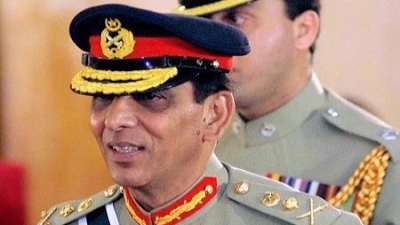
Pakistani ISI chief "knew of Bin Laden's presence in Abbottabad"
Lieutenant General Ahmed Shuja Pasha, was the Director-General of the Inter-Services Intelligence (ISI), Pakistan's main intelligence service, from October 2008 until March 2012.
The information came from a senior United States official, and I guessed that the Americans had intercepted a phone call of Pasha’s or one about him in the days after the raid. “He knew of Osama’s whereabouts, yes,” the Pakistani official told me. The official was surprised to learn this and said the Americans were even more so. Pasha had been an energetic opponent of the Taliban and an open and cooperative counterpart for the Americans at the ISI. “Pasha was always their blue-eyed boy,” the official said. But in the weeks and months after the raid, Pasha and the ISI press office strenuously denied that they had any knowledge of Bin Laden’s presence in Abbottabad.
Colleagues at The Times began questioning officials in Washington about which high-ranking officials in Pakistan might also have been aware of Bin Laden’s whereabouts, but everyone suddenly clammed up. It was as if a decision had been made to contain the damage to the relationship between the two governments. “There’s no smoking gun,” officials in the Obama administration began to say.
The haul of handwritten notes, letters, computer files and other information collected from Bin Laden’s house during the raid suggested otherwise, however. It revealed regular correspondence between Bin Laden and a string of militant leaders who must have known he was living in Pakistan, including Hafiz Muhammad Saeed, the founder of Lashkar-e-Taiba, a pro-Kashmiri group that has also been active in Afghanistan, and Mullah Omar of the Taliban. Saeed and Omar are two of the ISI’s most important and loyal militant leaders. Both are protected by the agency. Both cooperate closely with it, restraining their followers from attacking the Pakistani state and coordinating with Pakistan’s greater strategic plans. Any correspondence the two men had with Bin Laden would probably have been known to their ISI handlers.
...
According to one inside source, the ISI actually ran a special desk assigned to handle Bin Laden. It was operated independently, led by an officer who made his own decisions and did not report to a superior. He handled only one person: Bin Laden. I was sitting at an outdoor cafe when I learned this, and I remember gasping, though quietly so as not to draw attention. (Two former senior American officials later told me that the information was consistent with their own conclusions.) This was what Afghans knew, and Taliban fighters had told me, but finally someone on the inside was admitting it. The desk was wholly deniable by virtually everyone at the ISI — such is how supersecret intelligence units operate — but the top military bosses knew about it, I was told.
America’s failure to fully understand and actively confront Pakistan on its support and export of terrorism is one of the primary reasons President Karzai has become so disillusioned with the United States. As American and NATO troops prepare to withdraw from Afghanistan by the end of this year, the Pakistani military and its Taliban proxy forces lie in wait, as much a threat as any that existed in 2001.
Carlotta Gall's excellent article is consistent with the findings of the BBC's Panorama documentary "SECRET PAKISTAN" (2011).
BBC's "SECRET PAKISTAN"
Part 1. Double Cross
Part 2. Backlash
The buck stops with the President, Obama. Why is Obama turning a blind eye to the enemy rooted in the Pakistani military?
This is not Obama, the community organizer, representing the interests of the American communities threatened by a Pakistani nuclear bomb which the ISI could give, claiming "theft", to their Al Qaeda terrorists for a devastating attack on the US homeland.
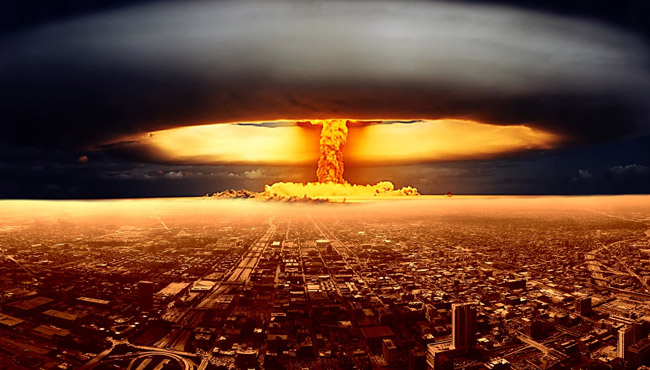
American communities may be devastated by a Pakistani nuclear bomb
This is Obama, the peace-prize winner, wishing a legacy of "war is over", and welcoming advice to surrender Afghanistan to the Pakistani military from Pakistan's woman inside the White House, Robin Raphel.
This is Obama, the defamation lawyer, denying the incompetence of his Secretaries of Defense - Gates, Panetta & Hagel - and their Pentagon advisers who have founded their failing Afghan strategy on co-operation with the treacherous Pakistani military, depending on Pakistan's roads and air-space for US and NATO logistics purposes but at the price of taking off the table the winning Afghan and war on terror strategy of regime-change of Pakistan via policies of ultimatums, sanctions and war under the Bush Doctrine to root out the generals and former generals comprising the Pakistani military dictatorship which continues to sponsor jihadi terrorism and imperialism behind the scenes of an elected but relatively powerless government of Pakistan.
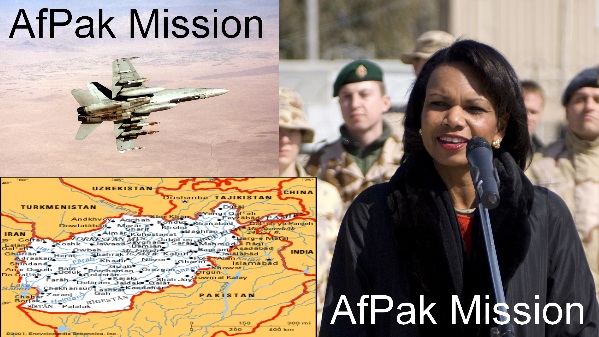
The AfPak Mission links
Channel www.youtube.com...
Forum scot.tk...
Twitter twitter.com...
Flickr www.flickr.com...
Blog afpakmission.wordpress.com...
edit on MarThu, 20 Mar 2014 12:32:58 -0500 -05:00America/Chicago31America/ChicagoThu, 20 Mar 2014 12:32:58 -0500 Thu by Mr Peter Dow because:
(no reason given)
Mr Peter Dow
Pakistani ISI chief "knew of Bin Laden's presence in Abbottabad"
Lieutenant General Ahmed Shuja Pasha, was the Director-General of the Inter-Services Intelligence (ISI), Pakistan's main intelligence service, from October 2008 until March 2012.
Sorry, wrong photograph. That's a photograph of another implicated former Pakistani ISI chief - General Kayani - more on him below.
Meanwhile, here is the correct photograph of Lieutenant General Ahmed Shuja Pasha.
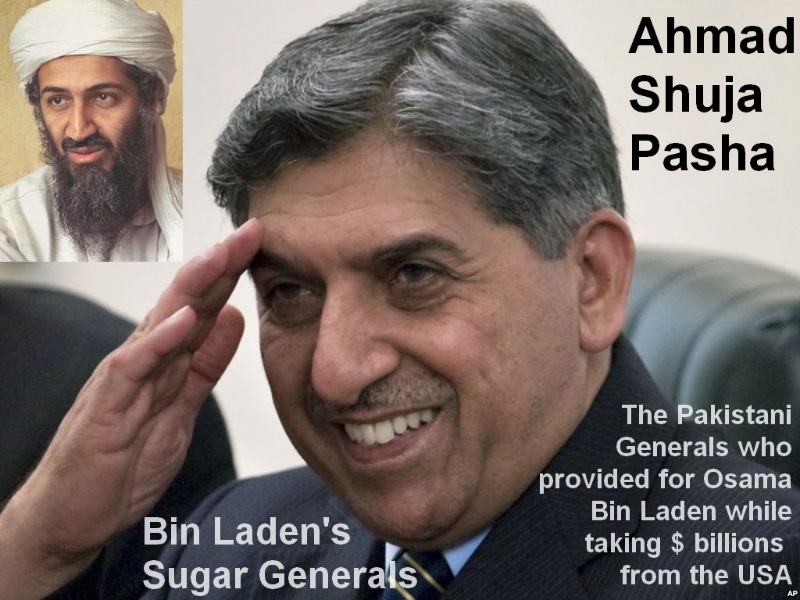
What the Pakistani ISI doesn't want Pakistanis to know
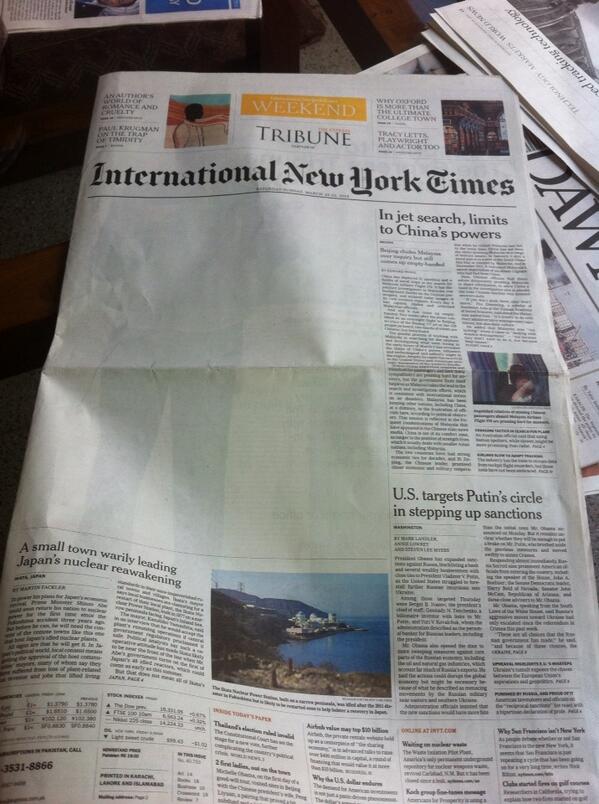
New York Times
Times Report on Al Qaeda Is Censored in Pakistan
An article about Pakistan’s relationship to Al Qaeda, and its knowledge of Osama bin Laden’s last hiding place within its borders, was censored from the front page of about 9,000 copies of the International New York Times in Pakistan on Saturday, apparently removed by a local paper that has a partnership to distribute The Times.
An image of the front page — with a large blank space where the article appeared in other editions — traveled rapidly around social media on Saturday. A spokeswoman for The New York Times, Eileen Murphy, said that the decision by the partner paper, The Express Tribune, had been made “without our knowledge or agreement.”
The partner was recently the subject of an attack by an extremist group, she said. “While we understand that our publishing partners are sometimes faced with local pressures,” she said, “we regret any censorship of our journalism.”
Though the article appeared to have been excised from all copies of the newspaper distributed in Pakistan, the story seemed to be available to Pakistani readers online, Ms. Murphy said. There was no answer at a number listed for the partner paper’s parent company, the Lakson Group, on Saturday.
...
The article in Saturday’s edition, by Carlotta Gall, explores the complex relationship between Pakistani authorities and militant Islamic extremism — which its powerful spy agency, Inter-Services Intelligence, has long been accused of supporting with the aim of furthering its own strategic interests. The article, which ran in The New York Times Magazine in domestic editions, is excerpted from a book by Ms. Gall, “The Wrong Enemy: America in Afghanistan, 2001-2014,” which will be published next month by Houghton Mifflin Harcourt.
In May of last year, The New York Times’ Islamabad bureau chief, Declan Walsh, was ordered to leave the country on the eve of national elections. His visa has not yet been reinstated, though the country’s prime minister, Nawaz Sharif, promised last week to review the case again.
Pakistan remains a dangerous place for reporters, with at least 46 killed there in the last decade, according to the Committee to Protect Journalists, an advocacy group.
In her article, Ms. Gall recounted being violently intimidated when she reported on the links to Islamic extremists, and Pakistani journalists have been beaten or murdered in attacks that some claim have involved national security or intelligence forces.
Again the extremists groups in Pakistan which are attacking, violently indimidating and killing journalists are directed by the Pakistani military ISI.
The ISI censors newspapers and murders journalists because it wants its secret war against the West kept secret.
Bin Laden's Sugar Generals
The Pakistani Generals who provided for Osama Bin Laden while taking $ billions from the USA.
Ashfaq Parvez Kayani & Ahmad Shuja Pasha
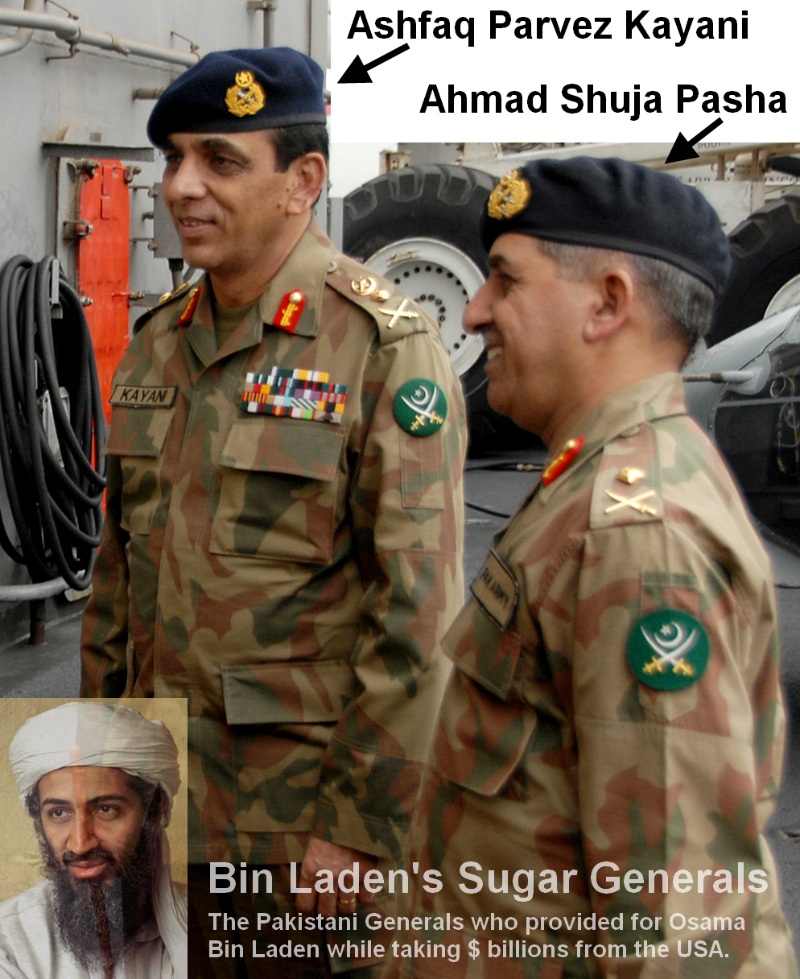
The enemy Pakistani generals who Obama pays with $ billions of American taxpayer money as they've sponsored terrorists to attack our homelands and kill our soldiers in Afghanistan.
Chief of Army Staff, General Ashfaq Parvez Kayani appointed Pasha as director general of Directorate of Inter-Services Intelligence (ISI), on 29 September 2008.
Previously, Kayani himself had served as director of the ISI from October 2004 to October 2007 and accordingly would have been responsible for providing safe houses for Bin Laden and other state sponsored terrorists during that period.
Directors General of the Pakistan Inter-Services Intelligence since 9/11
- October 1999 – October 2001: LGen Mahmud Ahmed
- October 2001 – October 2004: LGen Ehsan ul Haq
- October 2004 – October 2007: LGen Ashfaq Parvez Kayani
- October 2007 – October 2008: LGen Nadeem Taj
- October 2008 – 19 March 2012: LGen Ahmad Shuja Pasha
- 19 March 2012 – present: LGen Zaheerul Islam
Full list of DGs of the ISI, from 1948
OBAMA's EVIL MASTERS
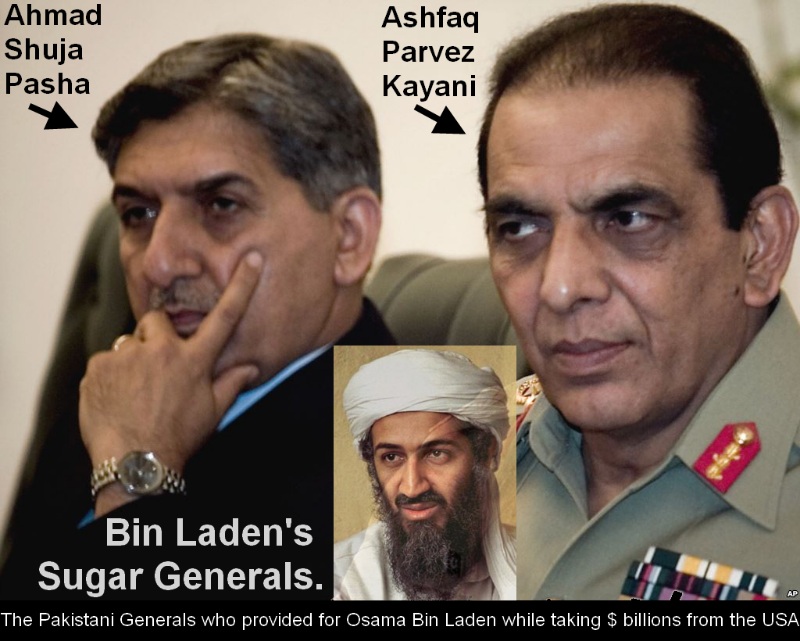
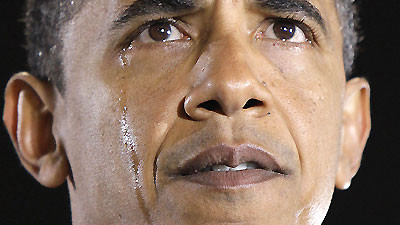
OBAMA - NEVER BEFORE HAS A PRESIDENT BROUGHT A SUPERPOWER SO LOW
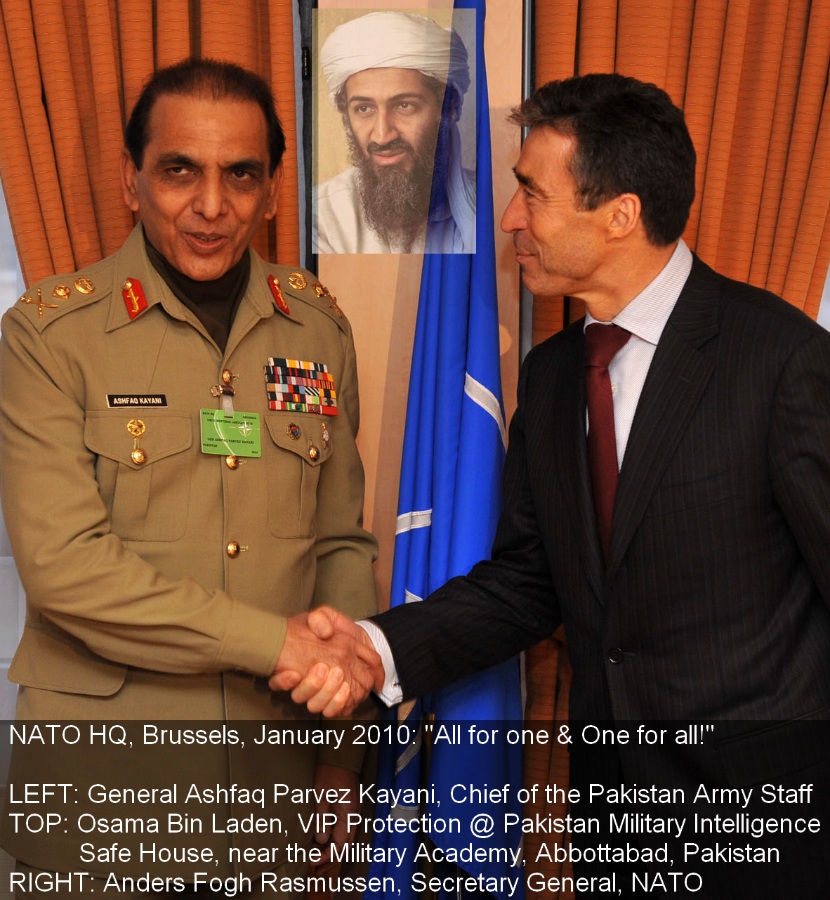
It ought to worry NATO that the NATO Secretary General, Anders Fogh Rasmussen was so naive, gullible and foolish as in January 2010 when he engaged in diplomacy with the enemy Pakistani generals who had been providing VIP protection to Osama Bin Laden and other Al Qaeda leaders in Pakistan.
It's not the job of NATO Secretary General to spend his (or her) valuable time on diplomacy with military enemies whose secret agent terrorist and insurgent forces have attacked NATO countries and our people many times.
The NATO countries have diplomats of their own. We didn't set NATO up to do more diplomacy but to offer military leadership to defend us from our enemies by military means!
But Rasmussen does things his own way.
Maybe Rasmussen thinks it is better if he, as NATO Secretary General, does diplomacy with our military enemies? Maybe he prefers appeasement to war?
Maybe Rasmussen actually has his head in the sand, is in denial about the treacherous nature of the Pakistani military high command and he really thinks Pakistani generals like Kayani are to be trusted?
NATO Military Committee concludes two days meetings in Brussels
NATO Website, 27 Jan. 2010
Regarding the regional approach, Pakistan Chief of the Army, General Kayani, briefed in depth the Committee on the Pakistani current strategy and on the ongoing operations against terrorism. Recognizing the necessity for continued cooperation with ISAF, he emphasized Pakistan’s role as a key enabler for success in Afghanistan.
Rasmussen is supposed to be defending NATO countries from our enemies, not shaking hands with enemy generals like we are "all for one and one for all" with our enemies!
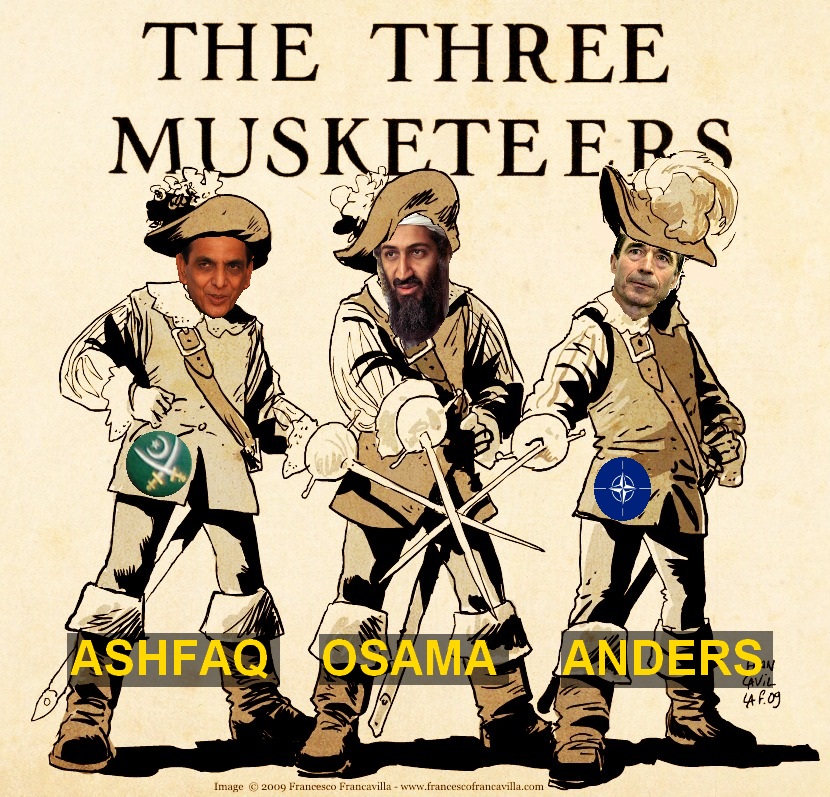
Not content with misleading NATO since 2009, Rasmussen has recommended a successor in the same mould of clueless and incompetent former prime ministers of kingdoms - Jens Stoltenberg, former PM of the Kingdom of Norway - who threatens to doom NATO to years of more bad leadership after Rasmussen has retired!
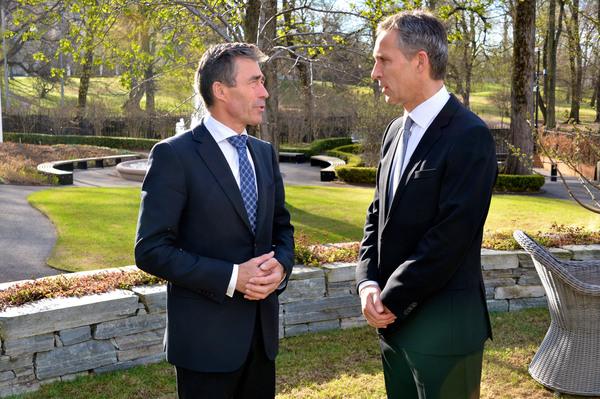
Anders Fogh Rasmussen (left) and Jens Stoltenberg (right) - a right pair of royalist idiots
See also
Royalist Stoltenberg to head NATO, harming democracy, helping enemies - See more at: www.abovetopsecret.com...
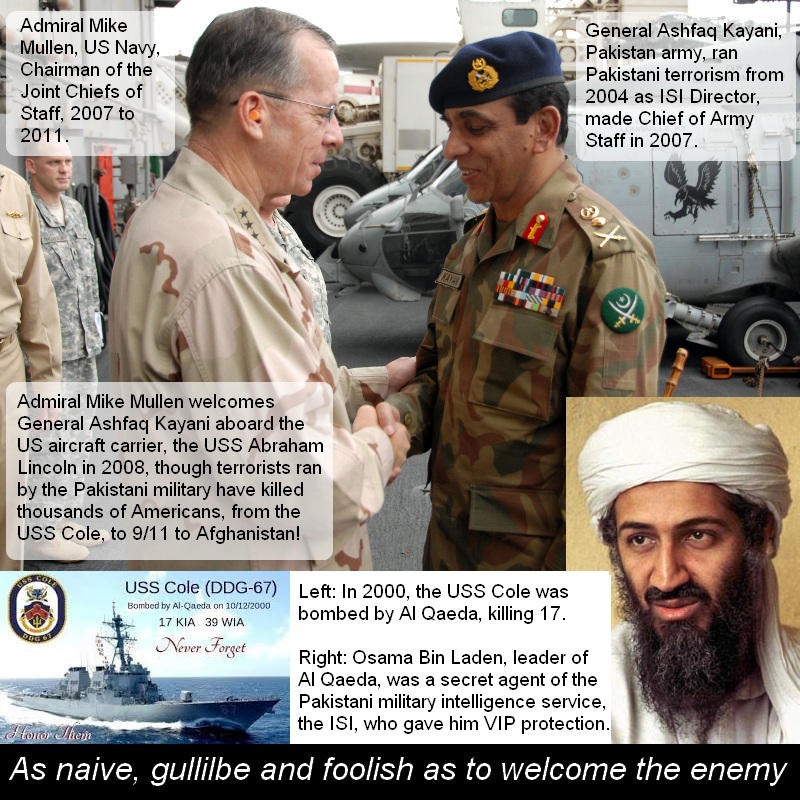
Top Left: Admiral Mike Mullen, US Navy, Chairman of the Joint Chiefs of Staff, 2007 to 2011.
Top Right: General Ashfaq Kayani, Pakistani army, ran Pakistani terrorism from 2004 as ISI Director, made Chief of the Army Staff in 2007.
Top: The photograph shows Admiral Mike Mullen welcoming General Ashfaq Kayani aboard the US aircraft carrier, the USS Abraham Lincoln in 2008, though terrorists ran by the Pakistani military have killed thousands of Americans, from the USS Cole, to 9/11 to Afghanistan!
Bottom Left: In 2000, the USS Cole was bombed by Al Qaeda, killing 17.
Bottom Right: Osama Bin Laden, leader of Al Qaeda, was a secret agent of the Pakistani military intelligence service, the ISI, who gave him VIP protection.
As naive, gullible and foolish as to welcome the enemy
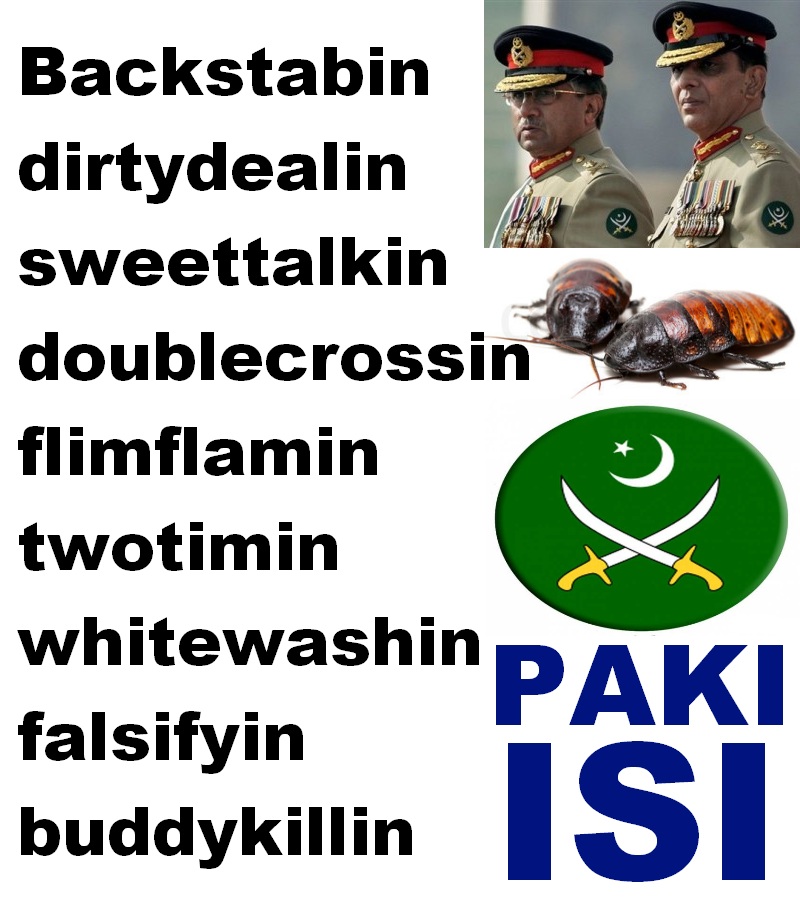
Backstabin dirtydealin sweettalkin doublecrossin flimflamin twotimin whitewashin falsifyin buddykillin PAKI-ISI
Inspired by the style of this Pepsi advert from the 1970s ..
p.twimg.com...:large
www.youtube.com...
new topics
-
Orange County Makes Shoplifting a Felony
Other Current Events: 3 hours ago -
It's Offical Now
US Political Madness: 5 hours ago -
The reason it works is.....
General Chit Chat: 6 hours ago -
Dick Van Dyke saved from Wildfire by neighbours on his 99th birthday
People: 9 hours ago
top topics
-
Orange County Makes Shoplifting a Felony
Other Current Events: 3 hours ago, 10 flags -
It's Offical Now
US Political Madness: 5 hours ago, 9 flags -
The reason it works is.....
General Chit Chat: 6 hours ago, 6 flags -
Dick Van Dyke saved from Wildfire by neighbours on his 99th birthday
People: 9 hours ago, 4 flags
active topics
-
Orange County Makes Shoplifting a Felony
Other Current Events • 14 • : nugget1 -
The Acronym Game .. Pt.4
General Chit Chat • 1025 • : FullHeathen -
Christmas Dinner ??
Food and Cooking • 18 • : network dude -
It's Offical Now
US Political Madness • 9 • : network dude -
-@TH3WH17ERABB17- -Q- ---TIME TO SHOW THE WORLD--- -Part- --44--
Dissecting Disinformation • 3810 • : 777Vader -
Post A Funny (T&C Friendly) Pic Part IV: The LOL awakens!
General Chit Chat • 7953 • : underpass61 -
Dick Van Dyke saved from Wildfire by neighbours on his 99th birthday
People • 1 • : soulrevival -
The reason it works is.....
General Chit Chat • 3 • : BeyondKnowledge3 -
London Christmas Market BANS Word ‘Christmas’
Social Issues and Civil Unrest • 44 • : Oldcarpy2 -
1 Billion dollars
General Entertainment • 12 • : Blueracer
